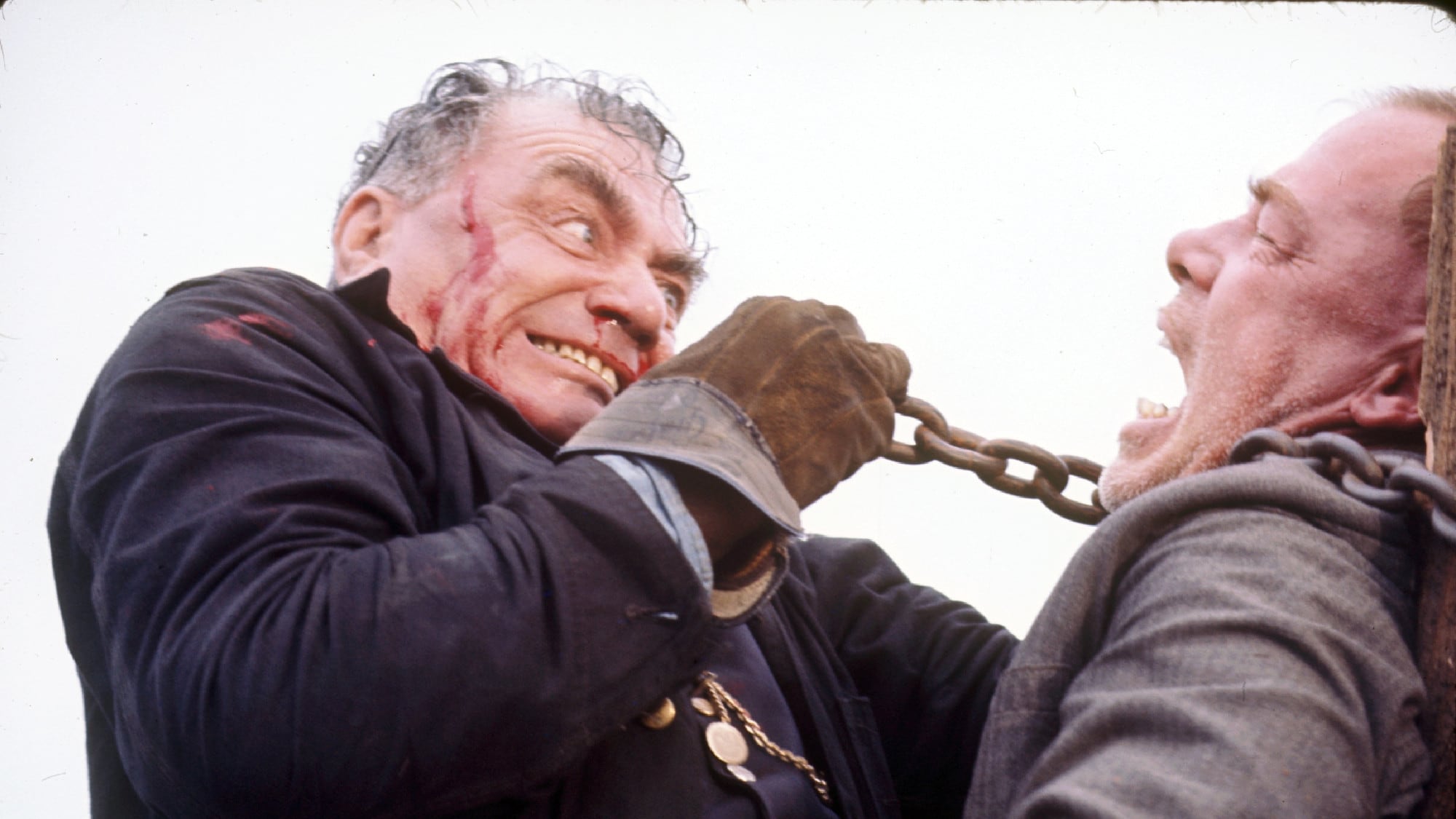If Paul Bunyan threw down with RoboCop, they couldn’t match the bare-knuckle brutality of A No. 1 vs. Shack in Emperor of the North (1973)—all for the right to ride a train.
Released 50 years ago this month, this Oregon-made slugfest pits a Depression-era railroad bull (Ernest Borgnine’s Shack) against the toughest hobo in the Lower 48 (Lee Marvin’s A No. 1).
Emperor of the North reunited two of director Robert Aldrich’s The Dirty Dozen (1967) stars for a forgotten action feature that employs Marvin’s and Borgnine’s star power like 300-pound cudgels.
Originally titled Emperor of the North Pole, the film was shot primarily around Cottage Grove, as the No. 19 rumbles north through Eugene and Salem. All along the track, destitute Hooverville denizens and railyard workers alike gossip and gamble on whether A No. 1 can hitch on Shack’s train all the way to Portland.
The film’s commercial failure in 1973 is a little hard to explain in retrospect. Yes, Emperor roves around a little too much, delaying the climactic showdown with off-track mentorship high jinks between A No. 1 and Cigaret, an arrogant hobo-wannabe played by fresh-faced Keith Carradine. And sure, the decision to shoot one critical set piece in artificial fog yields a scene more incoherent than raw.
But the filmmaking is as muscular and exciting as the performances—all mythic wide shots and gritty close-ups that idolize the broad shoulders and Easter Island heads of its stars. Marvin dares anyone to break his concentrated squint; the raging Borgnine might blow a gasket before his overworked locomotive.
Maybe the period particulars cooled audiences compared with, say, the much broader prisoners-do-a-tough-job pitches of Aldrich hits like The Dirty Dozen and The Longest Yard (1974). The director himself once lamented to Film Comment that he couldn’t believe moviegoers didn’t connect to Marvin’s character and his unflinching code of patience, self-sufficiency and picking only on bullies. What’s not to like? We’re talking about a character who’s introduced by beating back would-be robbers with a live chicken.
A half-century later though, the specificity makes Emperor a two-fisted delight. We’re thrust into a subculture cultivating its own lingo, rules and real-time folklore. It’s the kind of thin yet instantly legible world-building that makes John Wick so appealing.
Lines from onlookers like, “No one except A No. 1 could ride with the Shack!” resonate like barbershop debates about some underground heavyweight clash in a country hard up for heroes. (Though uncredited, the screenplay owes both names and tales to several published adventures of author Jack London and “King of the Hoboes” Leon Ray Livingston.)
As for the on-track action, the pulpy weapons and tactics feel equally organic, born of contextual necessity. A No. 1 and Cigaret board the train animalistically, tucking themselves into crevices and barrels. This is that rare film where someone catches a steam burn and uses a razor blade to smear the injured flesh with journal-box grease.
For his part, Shack’s ploys are all mean-spirited geometry to deny A No. 1 and Cigaret livable space. In one scene, he combs “the 19″ for riders yard by yard as it traverses the Buxton Trestle, so there’s no escape route but a death drop. Likewise, his weapon of choice is a footlong knuckle pin tied to a rope, sent bouncing beneath the train. He knows he’s found the distance when the trapped stowaways yelp in pain.
Portraying this industrious cruelty against the poor, Emperor is blunt and effective. While the film isn’t much for humanism or overt messaging, it’s plain to see A No. 1 is a man of the people and Shack a zealous steward of property rights. In 1933 (as today), the unhoused are treated as “a breed apart,” says the opening title card, and we see how their dehumanization stokes the sadism of authority figures.
Borgnine himself was awed by his character’s gnashing malevolence. In 2012, just a few months before his death, the 95-year-old actor told Portland Monthly that he frightened himself as Shack: “There were things coming out of me that I’d never done my life.”
Other characters in Emperor might agree.
“Jesus,” Cigaret softly winces during the final melee, watching Shack hurl a ball-peen hammer into A No. 1′s ribs. If either of them makes it to Portland, only their legends will be fully intact.
SEE IT: Emperor of the North, rated PG, is available for rent at Movie Madness.

